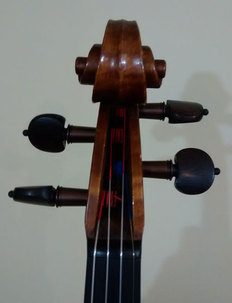I just finished installing a set of Perfection rosewood pegs on one of my violins pictured above. I've been installing mechanical pegs for clients, but I had no first hand long term experience with them. I had a set of rosewood pegs in stock and a violin that would look good with them, so it seemed like a good idea to try them. However, after my conversation and some internet research, suddenly I was wondering if I should have gone with Wittners. This curiosity grew as I read some reviews on the internet. The shop I am associated with goes almost exclusively with Pegheads. Good looking and reliable. Another shop in town goes almost exclusively with Wittners. Mechanically sound and easier to install.
I decided to ask my supplier about their perspective since they carry both. Their view is that from a performance perspective, the Wittners get the edge. They just feel a little nicer to turn. They would score 10/10 as opposed to Perfection pegs at a 9/10. From their view, both pegs work very well. The Wittner pegs have a composite head. They look like plastic, just like their excellent performing chinrests and tailpieces. The Perfection pegs come in 2 levels, composite and wood. In the wood, you have a choice of ebony, boxwood and rosewood. The wood headed Perfections cost slightly more than the Wittners and look more natural.
On my handcrafted violins, I'm always going to recommend the Perfections. They work well and are cosmetically vastly superior in my opinion. Yes, they are a little trickier to install, but that's my problem.
Having said that, my limited experience as a vendor of mechanical pegs has been somewhat mixed. On one set, the A peg would suddenly let go of tensioning the string. This is part of the peg design. Push in, it gets grippier, pull out and it lets go. Accidentally knock the head and it could let you down. Another player found that on the cello, it was easier to fine tune the A string using the fine tuner on the tailpiece. Without the fine tuner, they could still dial in the string, but it took longer. Another cello player tried them for several months and asked for a tailpiece with fine tuners to complement the pegs. Again, the pegs took too much time to adjust. Another client could never get the E string to hold it's position. It would slightly drift out of tune. I ended up removing the pegs and installing rosewood wooden pegs. (Yes, mechanical pegs can be removed.)
My current impression after a few days of trying these pegs is that they do the job. I'm used to tuning with wooden pegs on lots of different violins, so I don't find using well fitting wooden pegs to be a difficult task, and neither are the mechanical ones. However, I'm also used to having wooden pegs seizing up or letting go with changes in humidity. I don't expect that I will have that problem with these pegs.


 RSS Feed
RSS Feed